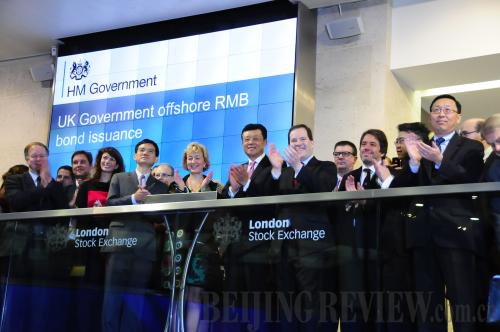|
 |
|
RMB BOND: The British Government on October 21 lists its first yuan-denominated sovereign bond on the London Stock Exchange (WU XINTAO) |
Supporting Growth
Finance ministers of Asian Pacific Economic Cooperation (APEC) member economies pledged on October 22 to flexibly implement fiscal policies in a joint statement released after the 21st APEC Finance Ministers' Meeting.
The pledge comes as they seek ways to boost economic and job growth amid a slow economic period. The finance ministers recognized that the global economy still faces persistent weak demand and that risks have risen.
"We reaffirm our commitments to address weakness in our economies and unleash new sources of potential growth including through new structural reform actions, and fulfilling existing reform commitments," said the statement.
The annual meeting came ahead of the APEC Economic Leaders' Meeting to be held in Beijing on November 10 and 11, which will be attended by leaders or representatives of the APEC member economies, including the United States, China, Japan and Russia.
These economies account for over half of the world's economic output, 40 percent of the world's population, and 46 percent of total global trade.
Construction Projects
The National Development and Reform Commission (NDRC) announced on October 22 it has approved feasibility reports on five airports and three railway projects, with a total investment of 150 billion yuan ($24.4 billion).
The five airports, with planned investments totaling 5.49 billion yuan ($896 million), are located in the provinces of Jilin, Qinghai, Yunnan, Guizhou and Inner Mongolia Autonomous Region, mostly in the country's western regions, according to statements on the website of the NDRC.
The three railway projects, which account for a majority of the planned investment, are worth 144.52 billion yuan ($23.6 billion).
The move came as the government looks to boost infrastructure investment in the country's less developed central and western regions to support the faltering growth.
New-Energy Buses
Chinese authorities released a plan on October 22 requiring the heavily polluted metropolises of Beijing and Tianjin as well as cities in Hebei Province to put more new-energy buses on the road to cut pollution.
China aims to promote the use of 20,222 new-energy cars in the region's public transport system from 2014 to 2015, according to the plan jointly released by seven departments, including the Ministry of Industry and Information Technology and the NDRC.
By the end of 2015, new-energy vehicles should take up no less than 16 percent of the total buses in those regions, the plan said. The total number of charging posts in areas targeted is projected to reach 19,657.
The announcement is the latest government effort to address increasingly serious pollution in the area.
Beijing and eight of its neighboring cities were among the 10 Chinese cities with the worst air quality in the third quarter.
The Beijing-Tianjin-Hebei region on average suffered from unacceptable levels of air pollution during 45 percent of the days in the third quarter, according to data released by the Ministry of Environmental Protection on October 21.
| 